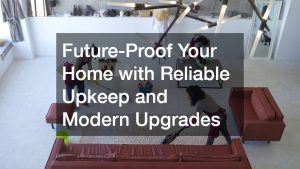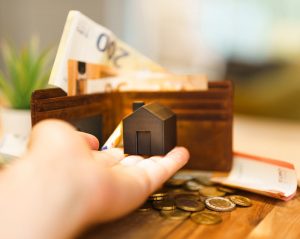Home renovations can be a significant investment, both in terms of time and money. However, renovations are not created equal when it comes to boosting your home’s value and attracting favorable house appraisals. Some upgrades give a higher return on investment (ROI) than others, making them more appealing to homeowners looking to sell in the future. Understanding which renovations yield the best results can be crucial, especially when considering factors like house appraisals. Here’s a detailed guide to eight home renovations that pay off, ensuring homeowners maximize their ROI.
1. Garage Door Replacement
Replacing a garage door may not be the most thrilling house update, but it’s undoubtedly one of the most lucrative in terms of resale value. After all, garage doors are among the most prominent features of a house façade, significantly influencing curb appeal.
According to a survey by Discover Home Loans, the average cost of replacing a standard 16’ x 7’ garage door stands at $4,513. However, the resale value paints a far more compelling picture, averaging $8,751. This significant increase in value is remarkable, particularly considering that it has nearly doubled in 2024 alone.
The estimate for this job is based on the cost of removing and disposing of existing garage doors and replacing them with four-section doors crafted from heavy-duty galvanized steel tracks. This includes a steel door featuring foam insulation with a minimum rating of R-12, paired with insulated glass windows situated in the top panel. It’s worth noting that this calculation assumes the reuse of the existing motorized garage door opener, ensuring both efficiency and cost-effectiveness.
Tips for Success
When considering a garage door replacement, it’s essential to prioritize quality and compatibility with your home’s architecture. Here are some tips for ensuring success:
- Choose a Style That Complements Your Home: Opt for a design that seamlessly integrates with your home’s exterior, enhancing its overall appeal.
- Prioritize Energy Efficiency: Select a door with adequate insulation to improve energy efficiency and reduce utility costs. You may consider spray foam insulation services, as they offer an energy efficient solution that can help maintain a comfortable temperature and reduce energy costs.
- Invest in Security Features: Enhance peace of mind by opting for robust security features, such as sturdy locks and reinforced materials.
- Professional Installation: Ensure that the installation is carried out by qualified professionals to guarantee optimal performance and longevity.
Types and Materials
- Steel Doors: Durable and low maintenance, steel doors can be insulated to provide better energy efficiency.
- Wood Doors: Offer a classic look but require more maintenance.
- Aluminum Doors: Lightweight and resistant to rust but can dent easily.
2. Entry Door Replacement

The entry door is often the first thing people notice about a home. Replacing an old, worn-out door with a new one can dramatically improve your home’s appearance and security.
Materials and Styles
- Steel Doors: Residential steel doors have surged in popularity, offering a remarkable 188% ROI in 2024, up from 100% in 2023. They provide enhanced curb appeal and energy efficiency, fitting tightly into door frames to reduce drafts and heating/cooling bills. Despite their sturdy construction, steel doors come in various styles and finishes, including options with windows for added aesthetic appeal.
- Fiberglass Doors: Installing a fiberglass grand entrance involves widening the existing doorway and adding decorative sidelights to match. This straightforward upgrade significantly improves curb appeal and offers a nearly 100% ROI in 2024, ensuring you recoup almost everything you spend at resale time.
- Wood Doors: Wood doors offer a high-end look but require regular maintenance. While they may not offer the same ROI as steel or fiberglass, they remain a popular choice for homeowners seeking timeless elegance.
Tips for Success
- Select a Door That Matches Your Home’s Style: Choose a design that complements your home’s architectural aesthetic, enhancing its overall appeal.
- Consider Energy-Efficient Doors: Opt for doors with good insulation properties to improve energy efficiency and reduce utility costs.
- Invest in Quality Locks and Hardware: Enhance security by choosing high-quality locks and hardware that provide peace of mind.
3. Kitchen Remodel

The kitchen is the heart of the home, and a well-executed kitchen remodel can significantly boost your home’s value. Modern kitchens attract buyers and make a strong selling point.
When considering the return on investment (ROI) and cost of a kitchen remodel, recent data indicates promising trends. On average, the cost of a kitchen remodel stands at $27,492, with an average resale value of $26,406. This translates to a cost recouped percentage of 96.1%, showcasing the financial viability of such a renovation. Notably, there has been a positive shift in ROI compared to the previous year, with a 10.4% increase in the cost recouped from 2023. These figures underscore the enduring appeal and value of investing in kitchen remodeling projects.
Key Improvements
- Cabinets: Refacing or replacing cabinets can transform the look of your kitchen.
- Countertops: Upgrading to granite, quartz, or other high-end materials can add value.
- Appliances: Energy-efficient, stainless steel appliances are highly desirable.
- Lighting: Modern lighting can enhance functionality and ambiance.
Tips for Success
- Focus on a layout that improves workflow and functionality.
- Stick to a cohesive design that complements the rest of your home.
- Prioritize quality over quantity in materials and appliances.
- Investing in kitchen remodeling services is a strategic move to enhance both your enjoyment of everyday activities and your home’s resale value.
4. Bathroom Remodel
Bathroom renovations offer both aesthetic and functional enhancements, making them a highly desirable feature for homebuyers. Realtors frequently recommend upgrading the bathroom before placing a home on the market, highlighting its importance in attracting buyers and increasing resale value.
When it comes to bathroom remodeling, recent data suggests promising returns. The average cost of a bathroom remodel is $25,251, with an average resale value of $18,613. This translates to a cost recouped percentage of 73.7%. Notably, there has been a positive shift in ROI compared to the previous year, with a 7% increase in the cost recouped from 2023.
The cost range is large, about $70 to $250 per square foot on average, and the return on investment is about 74%. As with kitchens, less is more, ROI-wise: Major bathroom remodels (involving changing the layout and using luxe materials) return only 45 percent.
Tips for Success
- When undertaking a bathroom remodel, consider hiring reputable bathroom remodeling contractors to ensure quality workmanship and timely completion.
- Focus on enhancing both the aesthetic appeal and functionality of the space, prioritizing upgrades that offer the highest ROI.
- Keep in mind that major bathroom remodels involving layout changes and luxury materials may not yield as high a return on investment as more modest upgrades.
5. HVAC Conversion
While HVAC conversion may not be the most glamorous of renovations, it reflects the growing trend towards renewable-sourced, eco-friendly, and energy-efficient HVAC systems. Heat pumps offer both heating and cooling capabilities, providing homeowners with year-round comfort while reducing energy consumption.
The average cost of an HVAC conversion is $18,800, with an average resale value of $12,422. This translates to a cost recouped percentage of 66.1%. Despite a decrease in the cost recouped from the previous year, HVAC conversions still offer a good return on investment.
Tips for Success
- When considering an HVAC conversion, consult with a reputable HVAC contractor to assess your home’s specific needs and determine the most suitable system.
- Prioritize energy-efficient options that not only reduce utility bills but also enhance the overall sustainability of your home.
- Consider the long-term benefits of an HVAC conversion, including improved comfort, reduced environmental impact, and potential energy savings over time.
6. Window Replacement

Windows are often referred to as the eyes of the home, and they play a crucial role in both aesthetics and energy efficiency. When considering window replacement, the choice of frame material can impact the return on investment (ROI). Let’s explore two popular options: vinyl and wood.
Vinyl Windows
By installing low-E, simulated, divided-light vinyl windows, you could recoup over half of the cost to replace your current windows. Low-E windows offer low emissivity, making them energy-efficient. Ensuring the exterior trim aligns with existing ones and leaving the interior trim untouched are vital steps in controlling costs. The average cost for this type of renovation, which typically involves replacing 10 windows, is $21,264.
Wood Windows
Opting for warmer wood windows, especially suitable for older or more traditional-looking homes, involves a higher cost. If you choose wood frames and follow similar specifications as with vinyl windows, the average cost for the job exceeds $25,000. While this option is more expensive than vinyl, the ROI is slightly less.
When undertaking window replacement, it’s essential to carefully consider the choice of frame material and other specifications to maximize ROI. Whether opting for vinyl or wood, prioritize energy-efficient features and ensure proper installation to enhance both aesthetics and energy efficiency while maximizing resale value.
7. Roof Replacement

A new roof not only improves the aesthetic appeal of your home but also provides essential protection against the elements. With fiberglass asphalt shingles often coming with a 25-year warranty, potential buyers are reassured of the durability and longevity of the roof, thus adding to the overall value of the property.
The average cost of a roof replacement is $30,680, with an average resale value of $17,461. This translates to a cost recouped percentage of 56.9%. Despite the significant initial expense, investing in a new roof can yield returns, with homeowners recouping approximately 57% of the upfront cost when selling their home.
Tips for Success
- When considering roof replacement, consult reputable roofing services to assess your roofing needs and select the most suitable materials.
- Opt for high-quality fiberglass asphalt shingles known for their durability and resistance to weather elements.
- Ensure proper installation by experienced professionals to maximize the lifespan and performance of your new roof.
8. Adding a Deck
When it comes to increasing your home’s appeal and functionality, adding a deck ranks high on many prospective homebuyers’ wish lists. Whether it’s for entertaining guests, relaxing outdoors, or expanding your living space, a well-designed deck can enhance your home’s value and curb appeal.
Wood Deck
Building a classic wood deck offers a timeless appeal and a solid return on investment. The average cost for a wood deck is approximately $17,615, with an average resale value of $14,596. This translates to a cost recouped percentage of 82.9%. The quoted price typically includes a 16×20-foot deck constructed with pressure-treated joists, which are supported by 4×4-inch posts secured to concrete piers, three steps, and a railing around the edge. Wooden decks have seen an increase in value since last year, reflecting homeowners’ ongoing desire to extend their living spaces outdoors.
Composite Deck
Composite decks, while more expensive upfront compared to wood, offer exceptional durability and low maintenance. The average cost for a composite deck is around $24,206, with an average resale value of $16,498, resulting in a cost recouped percentage of 68.2%. Although composite decks provide a slightly lower return on investment compared to wood, they offer benefits such as resistance to rotting, warping, and splintering, making them a popular choice among homeowners seeking longevity and ease of maintenance.
Tips for Success
- Consult reputable deck builders to assess your outdoor space and determine the most suitable materials and design for your deck project.
- Consider factors such as budget, desired aesthetics, and maintenance requirements when choosing between wood and composite materials.
- Prioritize proper installation and regular maintenance to ensure the longevity and functionality of your deck, regardless of the material chosen.
9. Hardwood Flooring
Hardwood flooring is synonymous with quality and sophistication, making it a popular choice for homeowners. While it is among the more expensive flooring materials, ranging from $6 to $18 per square foot (including installation labor), its timeless appeal and durability make it a worthwhile investment.
The 2022 Remodeling Impact Report by the National Association of Realtors/National Association of the Remodeling Industry reveals compelling insights into the value of hardwood flooring renovations. In 2022, the average cost of hardwood floor installation stood at $5,500, while the corresponding resale value averaged $6,500, resulting in a remarkable cost recouped percentage of 118%. This data underscores the enduring appeal and financial benefits of opting for hardwood flooring in home renovations.
Tips for Success
- Consult experienced professionals specializing in hardwood floor installation to ensure proper installation and optimal results.
- Consider factors such as wood species, finish options, and maintenance requirements when selecting hardwood flooring for your home.
- Regularly maintain and care for your hardwood floors to preserve their beauty and maximize their lifespan.
In Summary
Investing in home renovations can be a smart way to increase your property’s value and appeal to potential buyers. By focusing on improvements with high ROI, you can ensure that your investment pays off. Prioritize quality materials and professional installation to maximize the benefits and enjoy a more beautiful, functional home.




